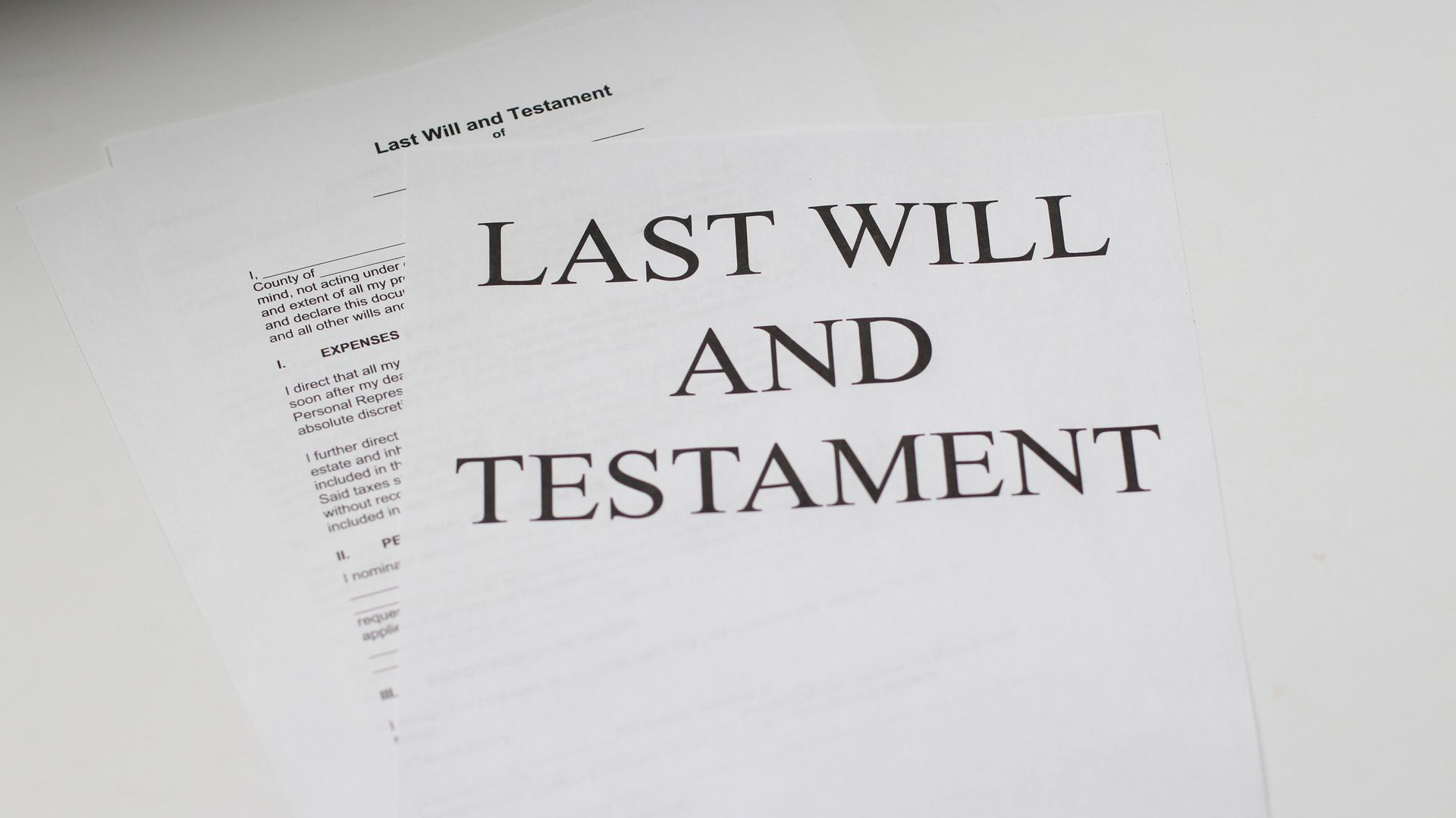Paragon Latest News

More couples than ever are choosing to live together without marrying or entering a civil partnership. While this arrangement works well for many, it can create significant inheritance tax and estate planning disadvantages on death. This article explains the main IHT disadvantages unmarried couples face compared with married couples or civil partners, the pitfalls of ‘leaving everything to each other’ (including life interest trusts), and why a nil rate band discretionary trust in a will is often a better planning tool for inheritance tax planning for unmarried couples. Inheritance Tax Planning for Unmarried Couples – Disadvantages Under the Inheritance Tax Act 1984, gifts between spouses and civil partners are generally exempt from IHT (the spousal exemption). Two allowances are central to IHT: · Nil Rate Band (NRB): currently £325,000 per individual. Up to this value, the taxable estate is charged at 0%. · Residence Nil Rate Band (RNRB): an additional allowance (subject to conditions) when a qualifying main residence is inherited by the deceased’s direct descendants. The current value is £175,000. For married couples or civil partners, unused NRB and RNRB can typically be transferred to the survivor, allowing up to two sets of allowances on second death. Unmarried couples do not benefit from these rules. In practice: · Gifts on death to an unmarried partner are potentially chargeable to IHT (subject to available allowances). · There is no automatic transfer of unused IHT allowances between unmarried partners. The transferable nil rate band is designed for spouses or civil partners only. The RNRB also has a practical trap in blended unmarried families. For RNRB purposes, “direct descendants” includes children, grandchildren and certain others; it also includes stepchildren. An unmarried partner’s child is not treated as the deceased’s “direct descendant”, so a gift of part of the home to that child will fail the “closely inherited” condition and the RNRB will be unavailable over that share. This is a key consideration in inheritance tax planning for unmarried couples with children from previous relationships. Leaving Everything to Each Other A common “simple will” choice is to leave everything to the surviving partner outright on first death. For an unmarried couple, that gift is not spouse-exempt. If the estate is above the available allowances, an IHT charge will arise immediately. Even where no IHT is payable on first death (because the estate is under the NRB), the second risk is that by gifting to the partner it will be bunching assets in them and without the benefit of any transferable allowances. Life Interest Trusts and Unmarried Couples Many wills include a life interest trust, either over the whole estate or just over the property (usually referred to as a Property Protection Trust or PPT). In simple terms, the survivor may have a right to occupy a property or receive income for life, with the capital eventually passing to named beneficiaries. These trusts can achieve non-tax objectives (for example, protecting a share of a property for children from a previous relationship). However, where the survivor benefits from a life interest, the trust will be considered as an Immediate Post-Death Interest (IPDI) and the trust capital will be taxed as part of the survivor’s estate for IHT on their death. Using life interest trusts for unmarried couples will therefore suffer the same IHT disadvantages as leaving to the partner outright. Why a Nil Rate Band Discretionary Trust Can Be More Effective A nil rate band discretionary trust is a will trust designed to capture up to the value of the NRB on first death. Instead of leaving everything outright to the partner, or tying up assets in a life interest, the will directs that an amount up to the NRB passes into a discretionary trust. Key features: · As a discretionary trust, the trustees decide who benefits, when, and by how much, from a class of beneficiaries (often including the surviving partner, children and sometimes wider family). · The trust is funded up to the NRB so no IHT is payable on that slice at the first death. · A discretionary trust is relevant property, and the beneficiaries of the trust are not considered as owning the trust capital for IHT. This avoids the trust fund being taxed as part of the surviving partner’s estate on their death. · The first partner’s NRB is used rather than wasted. · Trustees can lend to the survivor, assist with housing, or distribute to children depending on needs and tax position. While discretionary trusts are subject to their own IHT regime (periodic and exit charges under the relevant property rules), a trust funded up to the NRB is commonly structured to minimise or avoid such charges. Incorporating a nil rate band discretionary trust is a therefore a useful strategy in inheritance tax planning for unmarried couples. Example Andy and Betty are an unmarried couple. Andy has an adult child, Chloe, from a previous relationship. Betty has no children. They own a home as tenants in common and have separate savings. They want to provide for each other but also leave assets to Chloe. · Andy’s estate: 50% of the home (£350,000) + savings (£150,000) = £500,000 · Betty’s estate: 50% of the home (£350,000) + savings (£150,000) = £500,000 · Total combined wealth: £1,000,000 If they were married, they could simply leave everything to each other (or in life interests) and no IHT would be due. The spousal exemption will apply on first death. On second death, two sets of NRB and RNRB would be available regardless of who dies first, as Chloe is considered as Betty’s descendant for RNRB purposes as a stepchild. This will not be the case if they die unmarried. Option 1: Everything to partner Andy dies first and leaves his estate of £500,000 outright to Betty. · Andy’s NRB: £325,000. · The gift to Betty is not spouse-exempt. · Immediate taxable amount: £500,000 – £325,000 = £175,000. · IHT at 40%: £70,000 on Andy’s death. · Betty inherits £430,000 Betty now owns £930,000. When Betty later dies, she has only her own NRB (£325,000) because Andy’s unused allowance cannot transfer. · Taxable amount: £930,000 – £325,000 = £605,000. · IHT at 40%: £242,000 Option 2: Nil rate band discretionary trust + remainder to partner Andy’s will leaves the NRB (£325,000) into a nil rate band discretionary trust (beneficiaries include Betty and Chloe), and the balance (£175,000) to Betty outright. · IHT on Andy’s death: no IHT is due on the NRB Discretionary Trust · The remaining £175,000 to Betty is taxable at 40% as before · Betty inherits £105,000 Over time, trustees can support Betty (for example, by letting her live in the property or by lending funds). Crucially, the £325,000 in the trust is not part of Betty’s estate on her death, reducing exposure to IHT on second death. Betty now owns £605,000. Assuming the estate remained that value by the time of her death, her IHT would be calculated as follows: · Taxable amount: £605,000 – £325,000 = £280,000. · IHT at 40%: £112,000. Use of a NRB Discretionary Trust leads to an IHT saving of £130,000 over inheriting outright. Marriage/Civil partnership as an Option For some unmarried couples facing an IHT liability, it may be appropriate to consider marriage or civil partnership as part of their planning. This can significantly improve the IHT outcome because the spouse/civil partner exemption can allow assets to pass to the survivor free of IHT on the first death, and the survivor can benefit from transferred nil rate band and residence nil rate band from the first to die. That said, marriage/civil partnership can have important consequences beyond tax and they may wish to seek advice on creating a prenuptial agreement if they have significant wealth from before the relationship. While nuptial agreements are not automatically binding, the courts can give them significant weight where they are freely entered into, with full appreciation of their implications, and are fair in the circumstances. Conclusion For unmarried couples, the IHT framework is less generous than for spouses and civil partners. The absence of the spouse exemption and non-transferability of allowances means that common planning such as leaving everything to a partner, or relying on a life interest/PPT, can trigger tax when spouses would avoid it. The nil rate band discretionary trust offers a flexible and more tax-friendly alternative, but its implementation requires careful consideration of the client’s circumstances.

🛑 IMPORTANT UPDATE: Court Fees for Lasting Power of Attorney Are Rising in November 2025! 🛑 If you’ve been putting off setting up a Lasting Power of Attorney (LPA) — now is the time to act. From November 2025, the government is set to increase the court fees for registering an LPA. That means waiting could end up costing you more. At Paragon Legal Services, we specialise in making the LPA process simple, affordable, and stress-free. Whether it’s for health & welfare or property & financial affairs, we’ll guide you through every step to ensure your wishes are carries out and your loved ones are empowered to act on your behalf if needed. ✅ Secure your LPA now before OPG fees rise ✅ Gain peace of mind for you and your family 📆 Don’t leave it too late. Appointments are filling fast as more people act before the deadline. 📞 Call us today on 01206 544919 or 0800 0747642 to book your free consultation. Act now. Protect your future. Save money.

What do we mean by “blended families?” blended families are those that include spouses with children from previous relationships. Whilst this does bring excitement for new beginnings and the ability to share life and experiences as a larger family, it can, on occasion, have the ability to cause conflicts that were not intended where children can be disinherited. What kind of issues can arise? You may have the situation where the spouse or partner may have already written their will leaving their estate to their children and since being in a new relationship, have not considered amending their Will to leave some provision for their new family. If they have married their new partner the old Will will have been revoked on marriage but without writing a new Will their estate would then pass in accordance with the laws of intestacy meaning their own children could end up being disinherited. Where someone dies without a Will and has a new partner and would have wanted to provide for them and their children, this will not in reality happen as their estate will pass in accordance with the laws of intestacy which currently does not provide for blended families or even unmarried partners. One common query we receive is where the spouse has left their assets to their new partner or spouse on the basis they trust their new partner or spouse to ultimately pass those assets to the children. However, this doesn’t always happen and the children can end up being disinherited. Here are some useful estate planning tips for blended families: Consider the use of a trust Life interest trusts can be a useful trust for blended families as they provide protection from sideways disinheritance whilst still providing for the spouse or partner during the trust period. This type of trust allows the life tenant to receive income from the trust and sometimes capital at the discretion of the trustees which would enable the life tenant to maintain their lifestyle. However, when the trust ends, either due to the life tenant’s death, remarriage or otherwise, the assets that are in the trust ultimately go to those beneficiaries the testator wanted to provide for. This can therefore ensure children from a previous marriage are not disinherited. The only point to consider with this type of trust is that it will last until the death of the life tenant or earlier depending on what the trust period states, which means the children’s inheritance will be delayed until then. If, however, the testator does not want to make the decision as to how to divide the estate but wants the family to receive financial support as and when required, another option is a discretionary trust. A discretionary trust enables the trustees to decide how and when to distribute income and capital to the beneficiaries which makes the trust flexible. If one of the children was doing well financially, for example, the trustees may decide that they do not need to provide for that child but instead to the other beneficiaries who do require it. The testator can also write a non-binding letter of wishes which can provide guidance to the trustees when managing the trust. Update all legal documents We briefly touched on this point earlier but if someone has a Will in place leaving their assets to someone or various people and there is a change of circumstances meaning they are no longer in that relationship, it is a good idea for the Will to be updated to reflect the testator’s up to date wishes. While divorce does not revoke a Will, it does treat the spouse or civil partner as having predeceased the testator. However, the testator may have entered into a new relationship with a partner that has children and may want to provide for them also. If someone were to die without a Will, their estate will pass in accordance with the laws of intestacy. If they were separated from their spouse, for example, and had a new partner then legally they are still married and the spouse would therefore benefit from the testator’s estate as the intestacy rules do not make provision for unmarried partners. As well as the Will, any LPA’s, pension and life insurance documents should be updated accordingly. Clarity Ensure your Will is clear about who should receive what on death. If the Will refers to a gift being made to the children but it was intended to benefit both the children and stepchildren, the Will should explicitly say this. It may be that the testator chooses to gift one property to the children and then the residuary estate to the partner and stepchildren. Again, it is very important the Will specifically states this. The testator may wish to leave a greater amount to their own children than their stepchildren or provide for a child that is younger or has additional needs. As long as this is clear in the Will this is fine and a supporting letter of wishes setting out the reasons for this may be advisable. Own the property as tenants in common If the home is owned as joint tenants, on death, the share of the deceased will automatically pass to the surviving owner meaning children can be disinherited. Contrast this to a property held as tenants in common. Each owner will own a share of the property which can gifted to whom they wish in their Will. Risks of a Claim What are the risks if someone is not financially provided for? If someone is not provided for, they can bring a claim under the Inheritance (Provision for Family and Dependants) Act 1975. However, this is limited to the following categories of people who can claim under the Act: – Spouse/civil partner Former spouse/civil partner Child of his Child treated as a child of his Cohabitant Person who is financially dependent on him. As you can see from the above list this does include former spouses or civil partners who have not remarried or since entered into a civil partnership therefore advice should be sought about possible claims on the estate from them. It is good practice, where the intention is not to benefit someone from the estate, to specifically exclude them in the Will and have a detailed letter of wishes setting out the reasons for the exclusion. This comes back to what we mentioned earlier about clarity. It is also worth considering whether there are any financial orders in place in the event of a divorce that would prevent a former spouse from claiming any further provision. Stepchildren would most likely fall within the definition of “child treated as a child of his” or “person who is financially dependent on him.” Therefore, specific advice and consideration should be sought as how to balance the provision between both the biological children and stepchildren to take preventative steps from stepchildren claiming against the estate where they aren’t being provided for at all or provided for in the same way as the biological children. Estate planning for blended families requires careful consideration so it is important your wishes are clearly set out to avoid any misunderstandings or conflicts after your death. Seek advice from an estate planner or solicitor to ensure your loved ones are provided for in accordance with your wishes Source: SWW

Normally when we think of powers of attorney we think of Lasting Power of Attorney (LPAs). These documents allow a donor to appoint attorneys to make decisions on their behalf should they lose capacity to make their own decisions. They can be made to appoint someone to make decisions about health and welfare as well as property and financial affairs. In the case of managing financial affairs an LPA can also be used while the donor still has capacity to make their own decisions, making them useful for someone who has mental capacity but maybe still needs a bit of extra support. General Powers of Attorney (GPAs) are very different. This type of document can only be used by a donor wishing to appoint an attorney to manage their financial affairs and is only valid while the donor has mental capacity. As soon as capacity is lost the GPA is no longer useable and the attorney can’t make any more decisions for the donor. So why choose a General Power of Attorney right now? At the moment LPA applications are progressing quite slowly. The Office of the Public Guardian is doing it’s best to process applications within their target of 40 days, but like many companies right now they are running on reduced staff. This means that it’s taking longer to get an LPA registered, and if there are any issues with it it’s currently difficult to contact the OPG by phone. The more pressing issue though are the barriers to getting the LPA completed in the first place. Completing an LPA requires a donor, a certificate provider, at least one attorney, and a witness to witness the donor and all attorney’s signatures. In an ideal world the certificate provider could act as the witness to all people involved limiting the amount of people who need to be involved in the signing, but even without the current social distancing rules managing to gather the donor and all of their attorneys together is a rare occurrence, with attorneys often living far away from the donor. For a person who needs someone to make decisions for them right away a GPA can be a great alternative currently. There is no registration requirement, so the document is ready to use as soon as it has been properly signed. There are also less people involved in the creation of a GPA. The only people who need to sign are the donor themselves and a witness. There is no need for a certificate provider, and no need for the attorney to sign. The GPA is executed as a deed poll by the donor, so the rules on who can act as a witness for them are not strict. The witness must be over 18, have capacity, and can’t themselves be a party to the deed. The attorney isn’t strictly a party to the deed as they aren’t a signatory, but it is still best to avoid them acting as a witness. What this does mean though is that someone else in the household could act as the witness, allowing the document to be made without placing anyone at any risk. What this doesn’t mean… This doesn’t mean that LPAs should be forgotten about altogether. Since a GPA ends if the donor loses capacity it is still best to make sure that steps are being taken to get an LPA put in place as soon as it’s possible to do so. The body content of your post goes here. To edit this text, click on it and delete this default text and start typing your own or paste your own from a different source. source SWW

2023 could be the year of change for you, whether it be a new home, new job, marriage, divorce, or a new member of the family. Whatever it might be, are you aware of some of the different ways in which your Will could be affected? New Home If you have bought a new home, congratulations! Does your current Will include your previous home address? If so, please get in touch with your will writer to have your Will updated to ensure your new property is covered in your Will. What if this is not done? If for example your current Will gifts a property to your son and this property does not exist at the date of your death, the gift will fail. Marriage Did you know that marriage automatically revokes a Will? If your intention is for all your assets to go to your new spouse this is fine but at times, if you have children from a past relationship that you want to provide for, they can be disinherited. This would have the effect that on your death, your children receive nothing, everything passes to your new spouse and then to their loved ones. Of course, your children could challenge the will under the 1975 Inheritance (Provision for Family and Dependants) Act, but this is costly and time-consuming. To prevent the above, it is best to review your existing Will before you get married and either re-write it or include a contemplation of marriage clause in it. This is where you express a contrary intention to the ‘automatic revocation’ of your Will upon getting married. Specifically, this clause is a declaration within your Will that your intended marriage to your potential future spouse shall not have the effect of revoking your Will. Divorce Whilst divorce does not automatically revoke your Will, the reality is that you probably will not want your ex-spouse to benefit from your Will or any part of your estate. The good news is that the ex-spouse is treated as if they died when the divorce was finalised (decree absolute) and therefore cannot inherit from you. If there are any gifts to them in your Will, they will fail. However, if you did want your ex-spouse to benefit from your estate or receive something in your Will, you would need to have a provision in your will to state Section 18a Wills Act 1837 will not apply. Did you know an ex-spouse can try and claim from your estate on your death if they feel as if they should “have been given a piece of the pie” and had reasonable financial provision made for them? The best way to get around this is to exclude them from your Will and have the letter of wishes set out the reasons for this exclusion so if it ever is challenged, the Courts can look at what you have stated and consider it when reaching their verdict. Children Your current Will may state “children” or alternatively specifically name your children. If your Will states “children” this provides for any children that are living at the date of your death. However, if your current Will specifically names your children and you have had more children since, you will need to update your Will to include them also. With marriage could come step-children so let’s take a look at this now. Apart from legislation relating to the residence nil rate band, did you know step-children are not included in the automatic definition of “children, issue or descendants” when it comes to your Will? You may class them as your own children as you have looked after them for many years but even if this is the case, they will not benefit if your Will gives your estate to your children. Of course, they can challenge the Will on your death but to prevent costly and time-consuming litigation, if you wish for them to benefit under the terms of the Will, either specifically name them or have “children and step-children” written in the Will. Your estate planner will advise on this during your meeting. Property Abroad If you own a property abroad i.e. Dubai? We would advise you to have a Will in place in the country where the property is held. It is important to ensure the Will is restricted to assets in that country only. Why is this? If you write a Will in 2019 and then see a will writer in Dubai in 2022 and this specific Will is not restricted to assets in Dubai only, your 2019 will be revoked. If you wish to make amendments to your Will, have a new Will written or any supporting documentation, simply contact Paragon Legal Services Ltd who will be able to assist with putting these changes in place or draft any new documentation for you. Remember, if you have a new Will written, it will revoke any previous Wills. source SWW




